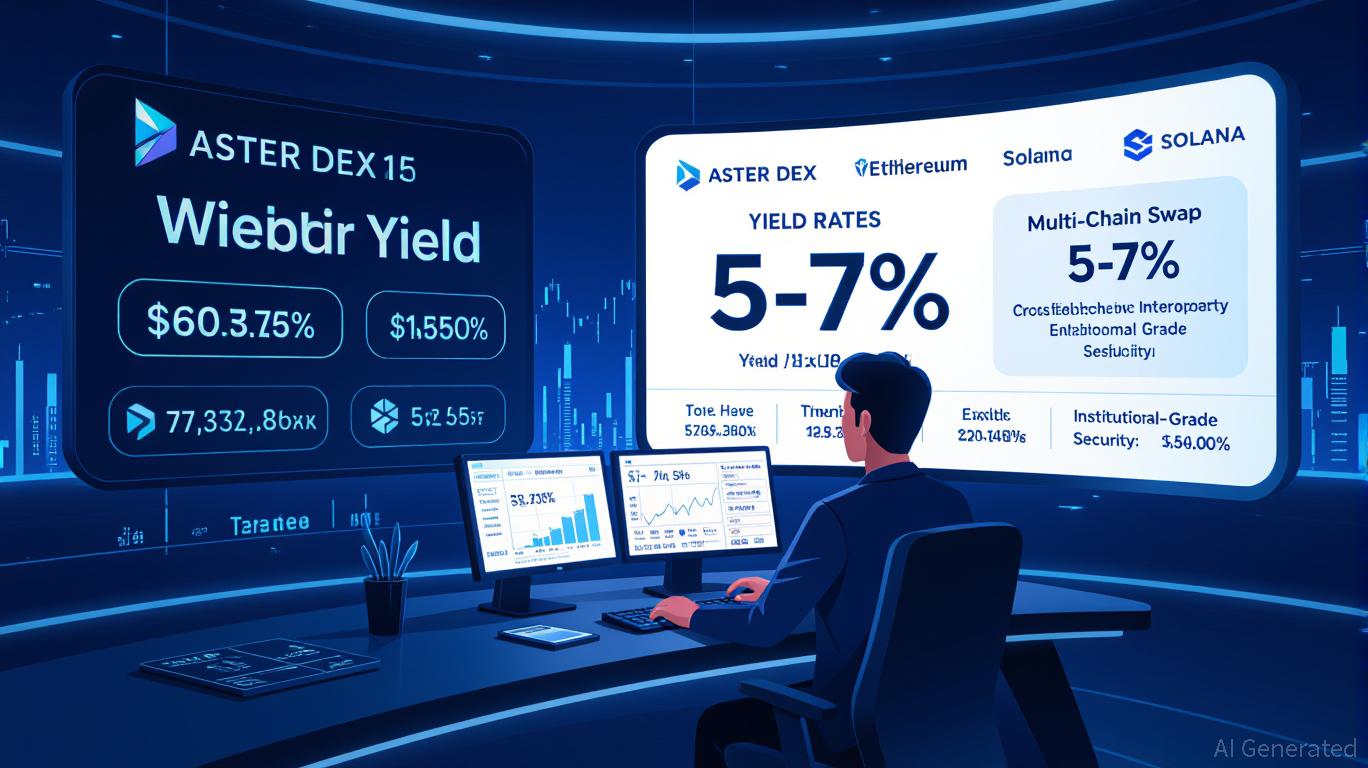Hilbert Views Concordium as a Link Connecting Traditional Finance and Regulatory-Compliant DeFi Systems
- Hilbert Group invests in Concordium's CCD token, its first core allocation beyond Bitcoin and Ethereum, citing confidence in its institutional-grade blockchain infrastructure. - Concordium's identity-verified blockchain with zero-knowledge privacy supports 2,000 TPS and PayFi features like geofencing, addressing scalability and compliance for enterprise use. - The partnership accelerates institutional adoption of blockchain bridging TradFi and DeFi, leveraging Concordium's MiCA/GENIUS Act alignment and c

Hilbert Group, a global digital asset investment company listed on NASDAQ, has revealed a significant long-term commitment to Concordium’s native token, CCD. This marks the firm’s initial major token investment outside of
Concordium’s blockchain stands out by incorporating identity verification at the protocol level, allowing users to interact with verification while maintaining privacy through zero-knowledge proofs. This system enables advanced PayFi (payment finance) capabilities, such as geofencing, scheduled token releases, and compliance mechanisms, all essential for enterprise use. The platform can handle up to 2,000 transactions per second, with transaction fees pegged to fiat currency, ensuring both scalability and predictable costs for institutional clients. Barnali Biswal, CEO of Hilbert Group, noted that Concordium’s technical strengths and regulatory focus make it a strong candidate to serve as a foundational layer for future institutional and consumer payment platforms.
This investment also signals a rising institutional appetite for blockchain solutions that can connect traditional finance (TradFi) with decentralized finance (DeFi). Concordium’s approach, which operates without smart contracts and aligns with global regulatory standards like Europe’s MiCA and the U.S. GENIUS Act, addresses major adoption challenges. By offering compliance-ready payment infrastructure, Concordium aims to support practical applications in areas such as escrow, trade finance, and collateral management.
For Concordium, the partnership with Hilbert Group opens up new avenues for collaboration in treasury operations, liquidity expansion, and ecosystem growth. Concordium CEO Boris Bohrer-Bilowitzki described the alliance as a “strategic investment” that will speed up institutional uptake and reinforce CCD’s function as the utility token at the heart of the PayFi ecosystem. This move also affirms Concordium’s commitment to a blockchain that balances privacy with accountability, supporting its goal to create a robust platform for the real-world economy.
With the stablecoin sector expected to expand from $280 billion in 2025 to over $3 trillion by 2030, Concordium’s infrastructure is well-positioned to benefit from this growth. Hilbert Group’s listing on Nasdaq First North Growth Market provides traditional investors with a regulated entry point into digital assets, further supporting the mainstream adoption of blockchain technology. The company’s diversification beyond Bitcoin and Ethereum reflects a wider industry trend toward infrastructure projects that prioritize scalability, regulatory compliance, and institutional needs.
Disclaimer: The content of this article solely reflects the author's opinion and does not represent the platform in any capacity. This article is not intended to serve as a reference for making investment decisions.
You may also like
Vitalik Buterin Backs ZKsync: Igniting Ethereum Layer 2 Innovation and Ushering in the Next Era of DeFi
- Vitalik Buterin's endorsement of ZKsync's Atlas upgrade accelerates Ethereum's ZK-based scalability strategy, positioning ZKsync as a key DeFi infrastructure player. - The upgrade achieves 15,000+ TPS with near-zero fees via ZK Stack, enabling 30% stablecoin dominance and bridging Ethereum's L1-L2 liquidity gaps. - Institutional adoption surges as ZK token gains 50% post-endorsement, supported by $15B in ZK-related DeFi inflows and StarkNet's TVL tripling in Q4 2025. - Upcoming Fusaka upgrades (30,000 TP

ZK Atlas Enhancement and Its Influence on Layer 2 Scaling
- The ZK Atlas Upgrade (Oct 2025) revolutionized Layer 2 scalability with 15,000+ TPS and $0.0001/tx costs via innovations like Atlas Sequencer and Airbender prover. - Vitalik Buterin's GKR protocol reduced ZK verification costs 10-15x, slashing Ethereum gas fees by 90% and boosting DeFi competitiveness. - ZK ecosystem TVL hit $3.5B by 2025, with $15B in Bitcoin ETF investments and 60.7% CAGR projected for ZK Layer 2 market growth to $90B by 2031. - Institutional adoption accelerated as stablecoins capture

Bitcoin Updates Today: Veteran Bitcoin Holders Selling Raises Questions: Is the Market Unstable or Undergoing a Tactical Change?
- Bitcoin OG holders are accelerating sales of decade-old BTC stashes, with $1B+ moved from pre-2018 wallets in 2025. - Analysts debate motives: Erik Voorhees sees long-term adoption focus, while Willy Woo cites quantum risk mitigation and SegWit address shifts. - Price volatility intensifies as BTC struggles to reclaim $105k-$106k support, with $722M realized losses and ETF buying ($530M) failing to offset selling pressure. - Historical patterns suggest potential 15-20% corrections, with on-chain expert D

DeFi’s Latest Gateway: How DASH’s Calculated Strategy Demonstrates Trustworthiness to Institutions
- Aster DEX's DASH token, with institutional backing, drives DeFi adoption through hybrid models. - DASH's yield-collateral model offers 5-7% returns, bridging traditional and decentralized finance. - Partnerships with Binance and $17.35B TVL validate Aster DEX's institutional credibility. - Price volatility and regulatory risks persist, but hybrid compliance tools mitigate challenges. - DASH's strategic move highlights DeFi's potential as a bridge to next-gen financial infrastructure.
